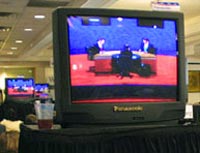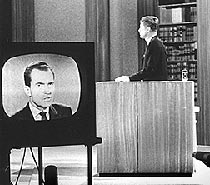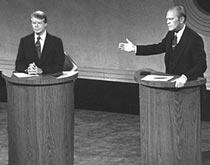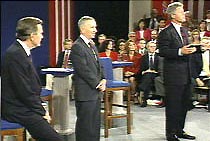| (insert your NIE or newspaper logo here) |
Weekly Online LessonOnline Lesson ArchiveGrade Level: 7-10
|
The Great Debate
 This week the American public will watch President George W. Bush and Senator John Kerry go head-to-head in their first televised debate.
This week the American public will watch President George W. Bush and Senator John Kerry go head-to-head in their first televised debate.
The two major presidential candidates will meet in the company of a moderator and studio audience in Florida on September 30, 2004, for this first of three scheduled debates. The debate will primarily focus on where the candidates stand on foreign affairs and homeland security.
The second debate, on October 8 in Missouri, will be held in a more informal town meeting (also called "town hall") style. This means that the discussion is open to all topics and most of the questions will be posed by members of the audience, rather than by a moderator. The third debate, on October 13 in Arizona, will highlight domestic and economic issues. Vice presidential candidates will face off during a debate in Ohio on October 5.
Some political analysts believe that these debates can make or break an election. Unlike political TV commercials, debates are the place where the candidates must respond to questions -- and each other -- in real time. It also gives the public a chance to scrutinize the candidates side by side.
To prepare for this key event, this week's lesson will show you how these televised debates -- from 1960 to 2000 -- have potentially influenced the race for the American presidency. You'll also learn how to analyze the upcoming debates and get involved in your own debate discussion groups.
Great Debate History
 Let's begin by watching some history over at the Museum of Broadcast Communications, and uncover how The Great Debate began and how it has worked over the years. (RealPlayer and audio speakers required to watch the videos.)
Let's begin by watching some history over at the Museum of Broadcast Communications, and uncover how The Great Debate began and how it has worked over the years. (RealPlayer and audio speakers required to watch the videos.)
Click The Great Debate: a documentary with Bill Kurtis. As Kurtis explains, the Nixon-Kennedy televised debate of 1960 was the first of its kind and may have had a major influence on the voting public.
As you watch the debate unfold, pay attention to how the two candidates behave and listen to what they say. What differences between Kennedy and Nixon do you notice? In what ways could their performances influence viewers in how they feel about each candidate?
Next, browse through the Reflections from those who were there and listen to some expert opinions about this historical event. Do they all hold a similar perspective about how the debate panned out for the candidates?
Now, browse the Commentary on the Great Debate. Make sure to visit with:
- Sidney Kraus, to hear his thoughts on The Great Debates as a Milestone and The Impact of Television on Politics;
- Newton Minow, who will explain how the League of Women Voters became the debate's organizers until the responsibility shifted to the Commission on Presidential Debates in 1988; and,
- Mary Ann Watson, as she provides some insight on Kennedy & Television.
Also read a few of the essays in this section, if you have time.
 Since 1960, the televised presidential debates have changed as technology, candidates, and the American public has changed. You can see these changes for yourself as you review Television Debate History: 1960-2000.
Since 1960, the televised presidential debates have changed as technology, candidates, and the American public has changed. You can see these changes for yourself as you review Television Debate History: 1960-2000.
Watch all of the videos and read the accompanying text from every election year, beginning in 1976 when Vice President Richard Nixon and Governor Jimmy Carter squared off.
Compare that with how President Carter did in 1980 against Governor Ronald Reagan and independent candidate John Anderson. Next, compare President Reagan's 1980 performance with the one in 1984.
In 1988, George Bush and Michael Dukakis met at two debates. In 1992, independent candidate Ross Perot and the new format of the Town Meeting shifted the nature of the debates. How did Bill Clinton do against Bob Dole in 1996? How did that compare to the debates between George W. Bush and Al Gore in 2000?
In what ways, and to what degree, does the state of the nation, global events, the well being of the American public, the debate moderator, and the candidates themselves influence each debate?
 Before turning off the Great Debate, read through the essays about Television: The Great Equalizer.
Before turning off the Great Debate, read through the essays about Television: The Great Equalizer.
Do you think the nature and popularity of television has shaped political races? How does television coverage of debates and broadcast reporting compare to that of print or online media?
For additional insight into the historical presidential debates, visit the PBS website, Debating Our Destiny.
Debate Watching
Now that you've seen some of these debates in action, let's get ready for the ones coming up over the next few weeks.
To do that, let's go to the Commission on Presidential Debates site and check out the Guide to Hosting Your Own Debate. What all does the host need to think about even before the candidates set foot in the place?
And what can you, the American citizen at home, do to get the most out of these debates? You can get involved with a DebateWatch by Hosting a DebateWatch yourself or by Finding a DebateWatch near you that's already scheduled.
Then be sure to take the time in advance to learn how to analyze the debates with A Viewer's Guide.
How many people do you know that plan to watch one or more of the debates? What are the reasons they want to watch? If some people are not interested, what are their reasons to not watch?
Ask about a dozen people who plan on watching the debates which candidate they favor and why. After the debate, ask them again. Did the debate seem to influence their position or perspective in any way?
Newspaper Activities
Follow coverage of the debates in Targetnewspaper, and watch each debate live on television, if possible. How do the reporters or analysts characterize the debate in general? What do they say about how the candidates, and the moderator, handled the questioning? Did the town meeting style seem to influence a candidate's performance compared to the more formal stand-behind-the-podium style? In what ways did the issues addressed influence the general debate as well as the performances of each candidate?
© Copyright 2004
Learners
Online,
Inc.
